Fair Coffee "We want a reasonable price"
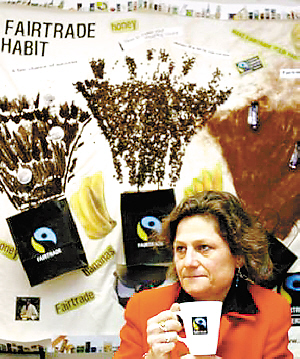
Fair Trade advocates reasonable trade and conscience consumption.
When it comes to drinking coffee, you may think of "Blue Mountain Coffee", "Brazilian Coffee" or "Cappuccino", but for African and Latin American farmers who grow coffee beans for a living, there are only two kinds of coffee: "Fair Coffee" and "unfair Coffee". Unfortunately, it is "unfair coffee" that is flooding the international coffee market. Although the price of cappuccino is on the rise, the price of coffee beans has fallen by almost 70% in the past decade.
Most of the world's poorest people depend on growing and exporting agricultural products for a living. But in the past 20 years of globalization, the prices of agricultural products have been falling. When Western countries continue to advocate free trade, on the one hand, they heavily subsidize domestic agricultural exports so that they can be dumped into the third World at low prices; on the other hand, through bilateral negotiations or international economic organizations, they ask third World countries to abolish tariffs, reduce policy subsidies and open up their markets. From coffee and cotton farmers in Africa to corn farmers in Mexico, millions of farmers in developing countries have been forced to sell their products cheaply or even pushed out of the market because of unfair trade rules.
Middlemen gain profits and farmers suffer losses
The comprehensive problem posed by unfair trade rules is the value of primary commodities. According to the Human Development report 2005 published by the United Nations Development Programme, more than 50 developing countries dependent on agriculture have at least 1% of their export income. The share of world trade as a whole has continued to decline, from 15% to 10% since 1980. For example, in the 1980s, coffee export earnings from developing countries were about US $12 billion, but in 2003, although they exported more coffee, their income fell to US $5.5 billion, less than half of what they used to be.
The report points out that the "coffee economy" is booming in rich countries. Today, retail sales of coffee in rich countries are as high as $80 billion a year, up from $30 billion in 1990. The profits of the world's six largest coffee roasters have soared due to low wholesale prices and high retail prices, accounting for 50 per cent of global coffee trade.
The figure of coffee trade is only a microcosm, and the same problems include agricultural products from developing countries such as chocolate, cotton, corn and fruits, as well as low value-added goods such as textile products and shoes.
Coffee
Coffee, one of the most popular drinks in the world, consumes up to 2 billion cups a day. Coffee has even become more than just a drink, it is a culture, representing a certain attitude towards life. When people pay attention to the decoration of the coffee shop, the aroma and concentration of the coffee, and sit on the soft sofa, they may not think of the farmers who grow coffee in the distant land-they are struggling on the edge of poverty and worried about the food and clothing of themselves and their families.
Ethiopia is the best example of these contradictions. Ethiopia is the birthplace of coffee. Today, 65 per cent of the country's export earnings come from coffee, and there are 1.2 million coffee farmers and 15 million workers in coffee-related industries. However, the decline in coffee prices in the international market has led to the collapse of the country's coffee economy, and many coffee farmers are on the verge of bankruptcy.
Ethiopia's coffee exports have increased by 2% since the mid-1990s, but the country's income from coffee exports has fallen sharply. The price of coffee fell from $1 per kilogram in 1998 to 30 cents per kilogram in 2005, reducing the average annual household income in Ethiopia by $200. How is this a huge loss for a country whose rural population lives on less than $1 a day? The total loss is equivalent to $400 million a year, or half of the total foreign aid received by Ethiopia each year.
Like coffee farmers in Ethiopia, many small coffee farmers in other African countries and Latin America receive pitifully little or even less than the cost of production, leaving them in a cycle of poverty and debt. "Today, for every dollar of coffee produced in Tanzania and sold in American cafes, coffee growers earn less than a cent." According to the United Nations Human Development report 2005.
On the other hand, coffee sellers, who do not produce coffee themselves, have made a lot of money out of coffee. Whenever coffee growing season is approaching or school is about to begin, coffee sellers and coffee brokers go to various coffee producing areas to lobby small coffee farmers who cannot afford tuition fees or cannot buy seeds and materials. use a small amount of money to book all agricultural works during the production season by way of loan or pre-purchase. Most of the world's coffee is obtained and sold in this way, this kind of coffee is called "unfair coffee", small coffee farmers become innocent victims under the pressure of money.
For example, the world-famous "Blue Mountain Coffee" of Jamaica, Japanese companies are the largest agents of "Blue Mountain Coffee" outside the United States, for no other reason-Japanese coffee companies provide loans to Jamaican coffee estates and the Jamaican government. on condition that they get a certain percentage of the sales ownership of Blue Mountain Coffee at a low price. In this way, some well-known coffee companies even ate an entire coffee estate in Jamaica.
Cotton
Cotton and other agricultural products in developing countries are also caught in a competitive dilemma caused by huge agricultural subsidies in Europe and the United States. In Europe, although the agricultural population accounts for less than 2 per cent of the total labour force, agricultural subsidies provided by European countries to their farmers reached $51 billion in 2005, absorbing more than 40 per cent of the EU budget.
The United Nations Human Development report 2005 confirmed that based on findings by relevant governments in Africa and other regions, American producers have accounted for about 1% of the world cotton export market. In Benin Bay in West Africa, the decline in cotton prices on the international market in 2001 caused the poverty rate in the region to rise from 37 per cent to 59 per cent.
Sugar
The United Nations Human Development report 2005 pointed out that European sugar farmers were paid four times the price of the world market that year, resulting in 4 million tons of surplus sugar; at the same time, with the support of 1 billion US dollars of European marketing, these sugars were dumped into the world market, making Europe the second largest sugar exporter in the world. This excess and dumping caused the world sugar price to fall by 1x3, resulting in a loss of income of US $494 million in Brazil, US $151 million in South Africa and US $60 million in Thailand.
Textile finished product
In terms of industrial products, textile products are the main products that have caused trade disputes between developed and developing countries in recent years. Developing countries gradually occupy the European and American markets by relying on their advantages in labor and price, and the exports of textiles and clothing from China, India, Indonesia, Pakistan, Bangladesh, Cambodia and Turkey have skyrocketed in the United States and Europe. In order to protect their own producers, European and American countries continue to set quotas and restrict imports of textile products for developing countries on the grounds of "dumping".
In this regard, Habinson, Special adviser to the Director-General of the WTO, commented that markets should open up to each other, and history tells us that it is not advisable for developed countries to resort to conditioned protectionism and deliberately seek restrictions.
Shoes
Some international well-known sports brands produce high-grade sports shoes at low cost in sweatshops in Southeast Asia and make high profits in Europe and the United States. For each pair of shoes produced by the factory, the purchase price is more than ten dollars per pair, but it is sold for hundreds of dollars on the market, while the workers who produce these shoes are paid meagre wages and are forced to work overtime.
"We want a reasonable price."
According to the United Nations Human Development report 2005, sub-Saharan Africa is increasingly marginalized in the world market. The region, with a population of 689 million, accounts for a smaller share of world trade than Belgium, which has a population of only 10 million. The report points out that if Africa could maintain its share of world trade in 1980, its exports today would be more than $119 billion, which is equivalent to five times the amount of aid provided to Africa by rich countries since 2002 in terms of foreign exchange.
Should we be content with receiving aid, or should we try to change trade rules, or try to fight for slightly more reasonable prices and benefits for ourselves? The choice made by the facts is already clear.
On January 29 this year, Mascara, a representative of the coffee farmers' cooperative in Ethiopia, the protagonist in the documentary "unfair Coffee", accompanied by film directors Mark Francis and Nick Francis brothers, went to London to meet with British Prime Minister Tony Blair to express his appeal for "fair trade" in an attempt to expand his influence. Fight for the best coffee price for the 105000 coffee farmers under their cooperatives.
Of course, for these farmers, the income from growing coffee is already a good price if it is enough to cover the planting costs and feed their families.
According to Mascara, Ethiopian coffee farmers sell coffee at a price of $1.60 per pound under the "fair trade" framework, with a profit of $1.10 after deducting costs. After that, the pound of coffee is roasted and the baker can sell it for $20,026; in a coffee shop, the pound of coffee can make 52 cups of espresso, which can sell for $160.
"this ratio should be changed," Mascara said. Our brothers have no shoes, our children have no money to go to school, we can't drink clean water, and we don't have a medical clinic. It's only fair that we should get at least $4 a pound for coffee. "
"of course, companies like Starbucks will donate money to Africa to provide clean water for some communities. Starbucks's donation to Africa last year was 1.5 million US dollars. But we don't want this kind of subsidy, we just need a reasonable price. " Mascara said.
Not only Mascara and his cooperative, but with the help of Fairtrade, orange farmers in Brazil, sugar cane farmers in Malawi in Africa, cocoa farmers in Dominica and banana farmers in the Windward Islands in West Africa. have partially joined the "fair trade" system to get relatively reasonable prices.
On the other hand, in addition to the efforts of farmers' cooperatives and Fairtrade institutions, the government has also begun to step in to fight for more reasonable prices for domestic products.
The Awakening of consumption consciousness "Ethical consumption" is sought after
From March 4 to March 11, the Fairtrade Foundation held its annual Fair Trade week across the UK to promote fair trade goods and provide free "Fairtrade" chocolates, biscuits, tea bags and coffee for everyone to taste.
The Fair Trade week, which aims to promote fair trade consumption, has been held in the UK for the 14th time this year. According to British media reports, over the past decade, the total value of fair trade products purchased by British consumers has increased rapidly at an annual growth rate of 40% to 90%, and "ethical consumption" has gradually become the mainstream of British society. In 2003, retail sales of Fairtrade products in the UK were close to £100m. The range of Fairtrade products has also expanded from coffee to 130, including bananas, chocolates, fruit juices, vegetables, dim sum, wine, tea, sugar, honey, drupes and cotton. Direct Coffee, the pioneer of the Fairtrade movement, has also become the sixth largest coffee brand in Britain. In 2006, the retail sales of Fairtrade products in the UK reached 290 million pounds, and the UK overtook Switzerland to become the largest "Fairtrade" product market in the world.
The success of promoting the consumption concept of fair trade is inseparable from the "Fair Trade Foundation". In 1994, five British charities focusing on the development of global inequality joined hands to create the organization with a small fund. "the mainstream of 'fair trade' products is a grass-roots phenomenon! The development of the concept of consumption comes from the awakening of consumers, who have learned that the prices of most foods are lower than they were 20 years ago, and unfair trade has left countless people struggling on the brink of survival! " Harriet Lamber, executive director of the Fair Trade Foundation, said.
The reason why Fairtrade products are becoming more and more popular in the UK, in addition to the efforts of the Fairtrade Foundation, it depends on the participation of numerous social movement groups and various social institutions that share the concept of "fair trade": the participation of schools, youth hostels, trade unions and other organizations makes the publicity network of "fair trade" spread all over the country. As a result, many consumers have the opportunity to get in touch with these products and identify with the ideas behind them. Residents of Gaston, a small town in Lancashire, for example, proudly claim to be the first "fair trade town" in the world. There are a total of 100 companies and social institutions in this town, of which 90, including schools, churches, car repairs, beauty salons and so on, sell Fairtrade products. For people in this town, selling and buying "Fairtrade" products is practicing the idea of "pursuing a fairer world".
The "Fairtrade" market is also growing rapidly in the United States and Europe, where the market for "Fairtrade" products grew by 30% in 2003, with sales exceeding 400 million pounds. Driven by various groups and campus students, coffee shops in more than 100 universities in the United States already sell "Fairtrade" coffee. Starbucks, the world's largest coffee shop chain and one of the symbols of globalization, has been selling "Fairtrade" beans in some stores in the United States since 2000 under intense pressure. However, although Starbucks is the largest coffee buyer of Fairtrade in the United States, this "Fairtrade" coffee is only a small part of Starbucks' coffee purchases.
Some people may think that conceptual goods such as "fair trade", like green consumption, are dominated by middle-class consumers, but in the UK, even working-class families may pay a little more to buy "fair trade" products.
Fair Trade News background
This newspaper comprehensively reports that the "Fair Trade" campaign advocates replacing "free trade" with "fair trade". In addition to calling for changes in world trade rules, it also encourages Western enterprises and consumers to choose "fair trade" products.
The basic goal of the Fair Trade campaign is to provide basic and stable income for vulnerable producers in the third World and to establish trade partnerships that make sustainable development possible. As a result, they set up a "fair trade" label system to issue fair trade labels as long as imports from third world countries (coffee beans, cocoa beans, sugar, rice, etc.) meet the standards. To meet the "fair trade" standards, acquirers must purchase from farmers in third world countries with guaranteed prices and long-term contractual relationships to ensure their basic income. The acquirer should also provide a guarantee fund to assist the development of the local community, and the local production organization is a small farmers' cooperative with democratic participation. For example, the market price of raw coffee beans is 30 cents a pound, but can be sold for $1.26 or more through the Fair Trade system.
The spirit of "fair trade" is that consumers pay a little more to buy the products of third world producers at guaranteed prices. instead of spending money to fatten middlemen and multinational enterprises, consumers let money go directly into the pockets of third world producers.
Sound
"in this life, I have many dreams. I want to build an unfinished house, I want to own a beautiful house, I want to create a bright future for my family, my son wants to learn to drive, he may be able to get a job if he learns to drive, but it costs too much money; my daughter wants to learn to use a computer. "
James Mavico, a sugar cane farmer in the African country of Malawi
"unfair trade policies continue to keep millions of people in the world's poorest countries out of poverty and perpetuate this filthy imbalance."
-- United Nations Human Development report 2005
"behind the rhetoric of the free market and the emphasis on the virtues of a level playing field, the hard fact is that some of the world's poorest farmers are forced to compete with the finance ministries of industrial countries rather than farmers in the north."
-Kevin Hawkins, Director, Human Development reporting Branch, United Nations Development Programme
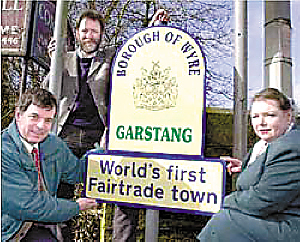
The British town of Gaston is the first "fair trade town" in the world.
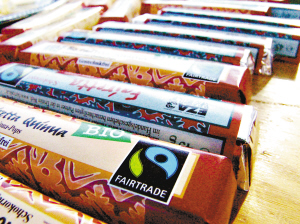
The product package is marked with an eye-catching "fair trade" logo.
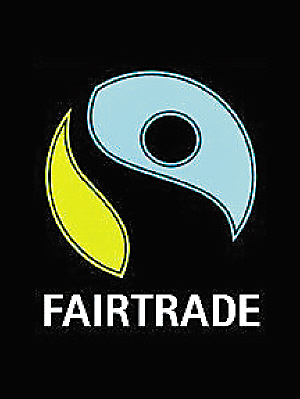
The logo of Fair Trade.
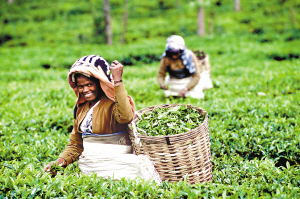
The women are picking tea.
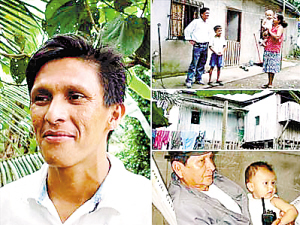
The Leisons are banana farmers in Ecuador.
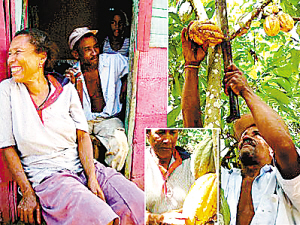
In the Dominican Republic, the Ovidia family specializes in cocoa beans.
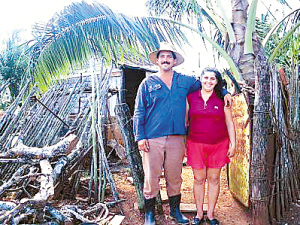
Mr. and Mrs. Carlos live by growing oranges in Cuba.
China Coffee Trading Network: www.gafei.com
Important Notice :
前街咖啡 FrontStreet Coffee has moved to new addredd:
FrontStreet Coffee Address: 315,Donghua East Road,GuangZhou
Tel:020 38364473
- Prev

Shenzhen is a fair trade "wasteland" to drink fair coffee in Hong Kong
In fact, fair trade is what farmers should give, and it is a reasonable return for farmers to pay what they deserve. This is not a kind of 'help' but a kind of 'fairness'. It is not that we give more than before, but that we give too little.
- Next
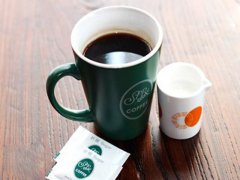
There is a big profit space in the self-service coffee machine market in China.
Compared with the traditional household coffee machine, the self-service coffee machine has the advantages of simple operation, many kinds of drinks, automatic sale and so on. In the United States, South Korea and other markets, self-service coffee machines average 20 people a month, and the huge market, but also formed a unique coffee culture, better for the penetration of self-service coffee machines to provide favorable conditions.
Related
- What brand of black coffee is the most authentic and delicious? what are the characteristics of the flavor of the authentic Rose Summer Black Coffee?
- Introduction to the principle and characteristics of the correct use of mocha pot A detailed course of mocha pot brewing coffee is described in five steps.
- Which is better, decaf or regular coffee? how is decaf made?
- How much is a bag of four cat coffee?
- How about four Cat Coffee or Nestle Coffee? why is it a cheap scam?
- Which is better, Yunnan four Cats Coffee or Nestle Coffee? How about cat coffee? is it a fake scam? why is it so cheap?
- How about Cat Coffee? what grade is a hoax? which instant coffee tastes better, four Cat Coffee, Nestle Coffee or G7 coffee?
- Process flow chart of coffee making-Starbucks coffee making process what coffee tastes good at Starbucks
- The top ten best coffee beans in the world Rose summer coffee or Tanzanian coffee tastes good
- Yunnan four cat coffee is good to drink?_four cat coffee is a big brand? four cat blue mountain coffee is fake?

